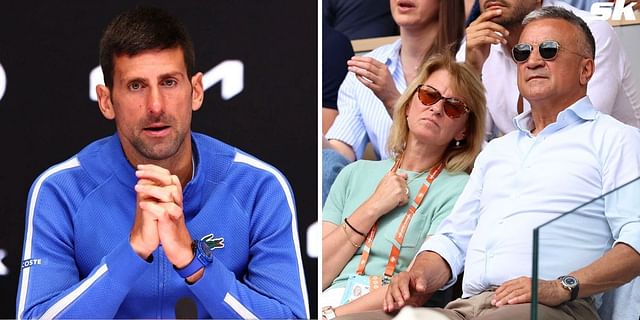
Novak Djokovic has always been open about his deeply traumatic childhood experiences in war-torn Serbia, but in a recent interview with *La Nacion*, the 24-time Grand Slam champion offered a heart-wrenching recount of a specific incident that left a lasting impression on him and his family. The tennis legend shared how his mother was rendered unconscious during one of the many bombings that ravaged their country, emphasizing how living through such hardship ultimately strengthened their familial bond, but also revealing the immense toll it took on his young mind.
Djokovic, now 37, has spoken extensively over the years about growing up amid NATO’s bombing of Yugoslavia during the Kosovo War, and how tennis became a mental escape for him. At just seven years old, he used to fantasize about winning Wimbledon, a dream that gave him comfort as bombs tore apart his homeland. For Djokovic, the tennis court was more than a place to compete—it was a sanctuary from the chaos that engulfed his everyday life.
In the interview, Djokovic delved into the horrors of living in a constant state of fear, not knowing if each day might be his last. “It’s a horror,” he said. “The worst thing anyone can experience. It’s the fear of the unknown. Not knowing if the next bomb is going to hit your head. And so it was every day, the alarms, the sirens that woke us up every night when the planes were approaching.” He described how these sirens became part of the nightly routine, a signal to drop everything and rush to the nearest shelter.
The most terrifying night for Djokovic came in 1999, when he was just 12 years old. One night, as bombs approached, the Djokovic family hurried to take cover in their building’s basement. In the panic, Djokovic’s mother, Dijana, struck her head on a heater and lost consciousness. For the young Djokovic and his brothers, ages eight and four at the time, the incident was overwhelming. “I remember my mother one night… because you’re sleeping and in the middle of the night you wake up because you hear the siren and you have to grab a bag and go down to the basement of the building to try to take shelter,” Djokovic recalled. “The first time it happened, my mother got up in the dark, because we all slept together, we didn’t know what was going to happen and we cried every night. And she hit her head against the heater and was knocked unconscious. So it’s 3 in the morning and my father has his wife unconscious. I was 12 years old, and my younger brothers, 8 and 4, were crying. There was total panic.”
Djokovic’s father, Srdjan, had to manage the situation as best as he could, trying to care for his wife while also keeping his terrified children calm. The experience left an indelible mark on Djokovic, as he saw firsthand how fragile life could be during war. But despite the trauma, he acknowledges that it helped shape who he is today, giving him a mental toughness that would serve him throughout his tennis career. “It’s an experience that strengthened us as a family, as people,” Djokovic reflected. “And I say it again: I don’t wish it on anyone. I want to make it very clear: I don’t think anyone should suffer through war to develop mental strength, there are other ways to do it. But for me, it was a very important part of my development and as a small child, I was forced to grow up.”
During the same interview, Djokovic also opened up about the responsibilities he had to shoulder as the eldest child in the family. With his father overwhelmed by the burden of protecting his family during a war, Djokovic had to grow up faster than most kids his age. “I had to take responsibility and share my father’s role, because I was the eldest son and there was no time,” Djokovic said. “My father spoke to me as an adult: ‘You have to do this, take your brothers there, go here.'”
The war not only robbed Djokovic of a normal childhood but also introduced him to a profound sense of helplessness that still haunts him. He described a memory from his 12th birthday, when he witnessed a military plane flying overhead while he was at a tennis club. “I remember the day I turned 12 and I saw a plane in broad daylight. I was at the tennis club and the alarms started going off. You hear them and suddenly you see the plane firing rockets over a military base or also over hospitals, schools, and bridges,” Djokovic recalled. “And then you think: ‘What can I do?’ You can’t do anything. And that’s the worst feeling, fear. You have no control, you have no power. There is a stronger power that can destroy you at any moment.”
Even in adulthood, Djokovic has been candid about how the trauma of war has stayed with him. Earlier this year, he revealed that he still experiences flashbacks, particularly when he hears fireworks, which sometimes trigger memories of bomb explosions from his childhood. “Whenever I hear fireworks, it brings back memories of bombs, because that’s what I heard when I was a child,” Djokovic admitted.
Through these experiences, Djokovic has emerged as one of the most mentally resilient athletes in the world. While his journey to tennis greatness has been filled with challenges, his experiences in war-torn Serbia have played a critical role in shaping the champion he has become. However, despite the strength he gained from these hardships, Djokovic’s story serves as a sobering reminder of the devastating impact of war on innocent lives.
Leave a Reply